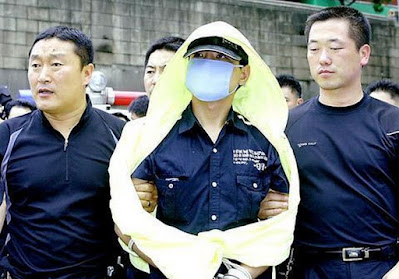The Raincoat Killer: Chasing a Predator in Korea is Netflix's latest true-crime documentary that you don't want to miss. The gripping three-part series documents the crimes of Yoo Young-chul, who killed 20 people, many of whom were sex workers or elderly and wealthy.
The documentary features new footage and features exclusive interviews with investigators and families of the victims to help catalog the crimes that rocked South Korea in the 2000s.
On July 15, 2004, Yoo was arrested by Seoul police after several massage parlor employees and the police staged an impressive sting. He initially confessed to murdering 19 people between September 2003 and July 2004, but the true number of his victims was revealed to be 20. Yoo also admitted to committing acts of cannibalism.
On December 13, 2004, Yoo received the death penalty.
The last time the death penalty was carried out in South Korea was in 1997 and the sentence has sparked a debate over the death penalty in the country.
In South Korea, execution is a form of punishment for acts of rebellion, conspiracy with foreign countries, homicide, robbery-homicide and 12 other offenses.
Today, Yoo is still awaiting execution at the Seoul Detention Center, over a decade later.
At his trial, prosecutors requested that he receive the death penalty, which Yoo reportedly thanked them for.
The Korea JoongAng Daily reported that Yoo responded to the prosecution's request in court by stating: "I am thankful for the prosecutors' request for the death penalty. I will be repenting what I have done until I die."
Many people in South Korea welcomed the death penalty verdict, but before his arrest in July 2004, there was talk of capital punishment being abolished.
According to a report in The Chosunilbo, since Yoo's arrest, the support for the death penalty has been reignited after the nation learned of his crimes.
The Chosunilbo reported in November 2004 that a bill with 151 signatures to abolish capital punishment was presented to the National Assembly by Uri Party Rep Yoo In-tae.
The bill aimed to replace capital punishment with a life sentence without parole. The Uri Party had been working since July 2004 to put an end to the death penalty, but it faced a great challenge after public opinion changed in light of Yoo's crimes.
Today in South Korea, capital punishment is still permissible under the law, but it has not been in operation since 1997. The last executions took place in December 1997, with 23 people put to death, according to Amnesty International.
Despite the unofficial moratorium on executions, the criminal justice system in South Korea has continued to sentence criminals to death.
For example, in 2019, Ahn In-deuk was sentenced to death for committing mass arson and murder, in an attack that killed five people and injured 17 others, KBS World Radio reported.
Criminals on Death Row
As of 2020, a total of 60 criminals remain on death row in South Korea, according to The Korea Times.
Amnesty International has been a key campaigner in abolishing the death penalty in South Korea since the 1990s.
In 2010, the South Korean Constitutional Court decided to uphold the death penalty in a five to four ruling.
The Constitutional Court stated capital punishment didn't violate "human dignity and worth," as protected in the country's constitution.
There is also growing support for the death penalty. A 2018 survey of 1,000 adults by the National Human Rights Commission of Korea found 79.7% of Korean citizens supported the death penalty, The Korea Herald reported.
However, the same survey also found 70% favored the option of alternative punishments to the death penalty.
The Raincoat Killer: Chasing a Predator in Korea is streaming on Netflix now.
Source: newsweek.com, M. Mitchell, October 22, 2021
🚩 | Report an error, an omission, a typo; suggest a story or a new angle to an existing story; submit a piece, a comment; recommend a resource; contact the webmaster, contact us:
deathpenaltynews@gmail.com.
Opposed to Capital Punishment? Help us keep this blog up and running! DONATE!
"One is absolutely sickened, not by the crimes that the wicked have committed,
but by the punishments that the good have inflicted." -- Oscar Wilde












.jpg)